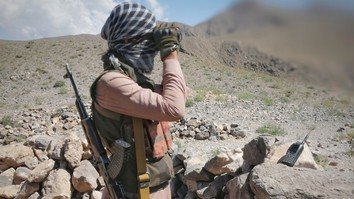SHIKARPUR, Sindh -- Relatives of worshippers killed or injured by a 2015 suicide bombing at a Shia mosque in Shikarpur gathered on January 30 to observe the fifth anniversary of the tragedy.
They were joined by area residents and peace activists at the mosque, where 61 people died and more than 100 were injured in the attack carried out by the Khorasan branch of the "Islamic State of Iraq and Syria" (ISIS-K).
The bombing, which occurred during Friday prayers, still haunts many residents of Shikarpur.
Such violence betrays the principles of Islam, said Allama Zahid Naqvi, a Shikarpur-based scholar who lost three close relatives including a brother that day.
![Karachi civil society activists in February 2015 protest the suicide bombing on a mosque in Shikarpur District. [Zia Ur Rehman]](/cnmi_pf/images/2020/02/04/22235-pf_shikarpur_bombing_photo_2-585_329.jpg)
Karachi civil society activists in February 2015 protest the suicide bombing on a mosque in Shikarpur District. [Zia Ur Rehman]
"The actions by ISIS-K, such as attacking mosques and killing worshippers, go against Islamic principles and consequently defame Islam," said Naqvi.
ISIS-K always has sought to target the religious and sectarian pluralism of the province, he said.
"But it could not succeed in its nefarious goals as the residents, religious scholars and civil society jointly condemned all terror attacks," he said.
Ali Zafar, a resident who was injured severely, said that he can never erase the images of the horrors he witnessed that day.
"I cannot forget the cries of the devotees for help and the blood-stained clothes of the killed and injured," said Zafar.
The visits of civil society activists across the province to the area's religious places and shrines days after the bombing were an example of the resilience of the public, according to Zafar.
Weakening of ISIS-K
Residents of the area are optimistic that peace is starting to return to Sindh after the masterminds of the 2015 bombing, Maulvi Abdullah Brohi and Abdul Hafeez Pindrani, were killed in a shootout with police in February 2019.
The two orchestrated several other attacks in Sindh and Balochistan provinces. They mainly targeted Shia worship places and Sufi spiritual leaders as well as political rallies, killing and injuring hundreds of Pakistanis.
Their deaths not only weakened the insurgent group in the region but also helped stem the fear of rural residents of Sindh.
Brohi and Pindrani were the commander and deputy commander of ISIS-K in Sindh, respectively, and were wanted for a number of terror attacks in Sindh and Balochistan since 2010, said Sajid Amir Saduzai, who was Shikarpur police chief when the two terrorists were killed.
One of ISIS-K's most devastating terrorist acts was the July 2018 suicide bombing at an election rally for Balochistan Awami Party candidate Siraj Raisani in Mastung District, Balochistan. It killed 149 people including Raisani.
A February 2017 suicide attack on Sufi saint Lal Shahbaz Qalandar's shrine in Sehwan also killed 85 people and injured more than 300, while an October 2016 assault on Quetta's police training centre killed 61 cadets.
Brohi and Pindrani were terrorists even before ISIS-K's heyday. Authorities have accused them of three deadly attacks in 2013.
They were involved in a suicide bombing in Shikarpur targeting politician Dr. Arif Jatoi, head of the National People Party, who survived, according to Saduzai.
In addition, spiritual leader Pir Hussain Shah was targeted by the insurgents in Jacobabad. He survived, but his grandson was killed. Yet another attack in Shikarpur killed spiritual leader Pir Syed Hajjan Shah and three of his devotees, recalled Saduzai.
"The group was causing a law-and-order situation in the Sindh-Baloch border region," he said. "After the killing of their leaders, the region has seen a significant reduction in terrorism."
Withering attraction
The killing of the ISIS-K leaders in Sindh "caused a major dent to the operational capabilities" of the terror outfit in 2019, the Pak Institute for Peace Studies observed in a recent annual report.
Another major factor behind the withering attraction of ISIS-K within Pakistan's militant circles is the death of ISIS chief Abu Bakr al-Baghdadi in Syria last October and the group's territorial losses in Syria, the report said.
Naqvi, whose family members died in the 2015 mosque bombing, said he is satisfied with the efforts by law enforcement agencies in rural Sindh to crack down on militants.
"After the suicide bombing of Sehwan in 2017, the rural areas of Sindh did not see any terror attacks," said Naqvi. "It showed that ISIS-K's local affiliate has been weakened after the killing of Brohi and Pindrani."

![Police personnel on January 26 perform their duties in Karachi. The killing of ISIS-K's two Sindh commanders in a police shootout in February last year has weakened the terror outfit in the region, analysts and activists say. [Zia Ur Rehman]](/cnmi_pf/images/2020/02/04/22234-pf_photo_1-585_329.jpg)






